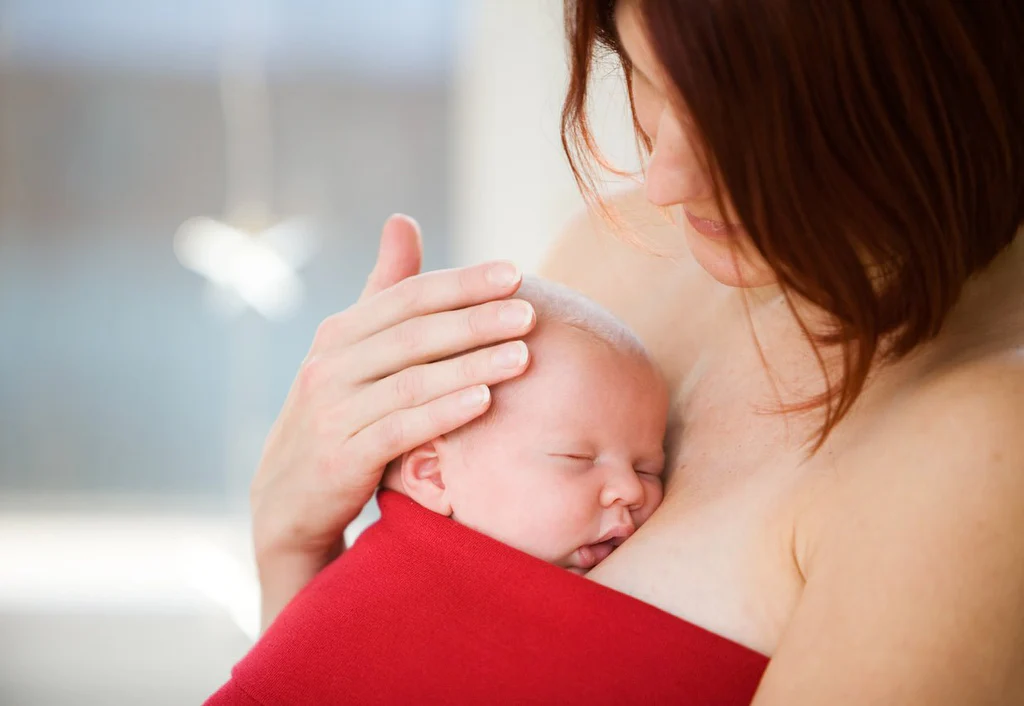Skin-to-skin and the golden hour: the quiet magic of those first moments

Skin-to-skin and the golden hour: the quiet magic of those first moments...
There’s a moment after birth when the world seems to stand still.
The room is buzzing, the midwives are busy, your mind is spinning — but then someone places your baby on your chest and everything goes quiet. It feels like it's just you and your baby. That’s the golden hour. And it’s not just 'a moment'— it’s biology doing what it does best.
What’s actually happening in that first hour
When your baby is born, everything about their tiny body is working hard to adjust. Their heart rate, breathing, body temperature and blood sugar are all finding their new rhythm.
And you — their mum — are the most familiar, stabilising thing they know.
When they’re skin-to-skin, their body literally syncs with yours. Your temperature adjusts to keep them warm (which even now, after literally decades of experience, still blows my mind). Your heartbeat calms theirs. Your breathing guides their breathing. It’s one of the most instinctive and beautiful forms of regulation we have as humans.
The benefits (without the jargon)
We know from decades of research that skin-to-skin helps babies transition safely and calmly into the world. But it’s also a deeply emotional moment for parents.
It:
- Keeps baby warm and stable without needing machines or blankets.
- Reduces crying and stress for both of you.
- Encourages an early, instinctive latch and supports milk supply.
- Releases oxytocin (the “love hormone”) which helps your uterus contract, reduces bleeding and promotes bonding.
- Lays the foundation for long-term emotional connection.
These aren’t “nice-to-haves” — they’re proven, essential parts of newborn care. The World Health Organization calls it “the standard of care,” and countless studies show it improves outcomes for both mum and baby. I remember a time when skin to skin wasn't 'the norm'. Sadly it wasn't that long ago, and in some hospitals, it still isn't the regular practice.
When plans change
But what if your birth looks nothing like you imagined? Maybe you have a caesarean, maybe your baby needs to be checked over, or maybe you’re simply too exhausted to think.
That’s okay.
Skin-to-skin doesn’t have to happen perfectly or immediately. If you can’t do it right away, your partner can. Babies didn't read the manual (sadly!)— they just know warmth, heartbeat and safety.
Protecting your golden hour
In busy hospitals, it’s easy for those early minutes to get swallowed up by routine checks, cleaning and paperwork. There are boxes to tick, guidelines to follow (trust me, I've worked in many a hospital!) and people to answer to. But you’re allowed to ask for that time. You can say: “Please wait until we’ve had our first feed before weighing.”
That first hour belongs to you and your baby. You’ve both earned it. The World Health Organization (WHO, 2023) recommends that all newborns are placed skin-to-skin with their mothers immediately following birth for at least one hour- so you don't need to feel 'difficult' for asking. It's an international standard that all hospitals should be following.
As a paediatric nurse and lactation consultant, I’ve been privileged enough to attend literally thousands of births across the UK and the GCC. And it’s always the same — when parents are given the space for that quiet hour, everything about the start of feeding and bonding feels easier. It's like it's your moment to breathe, process and become a family with a tiny human in it.
It’s not about doing things perfectly. It’s about presence. Those little moments where your baby’s breathing evens out on your chest — that’s where confidence begins.
If you’re pregnant in Dubai, our Birth & Beyond Antenatal Masterclass walks you through what actually happens after birth — not just the hospital plan, but the real, human side of recovery and connecting with your new baby. We’ll talk skin-to-skin, feeding, partner support, and what those early days really feel like. There's no vested interests, no paid sponsorship, and no affiliation with any hospitals. Simply me and The Fit Midwife (Nicola Oliver), guiding you in what you need to know (because you don't know what you don't know!), and also answering any burning questions you have about giving birth in Dubai.
Classes are held across the UAE, GCC and virtually.
Find out more at Lullabies.ae
Important information
There is constant research in this field to ensure the safety of our children and guidelines and recommendations are updated regularly. Please remember that this article is a summary only of current guidance and check the links listed for more in-depth information. It is not intended to be an exhaustive list, only to be used as guidance. Your own country may also have their own guidance. If in any doubt about any aspect of your baby/child's care, please consult with your paediatrician.
